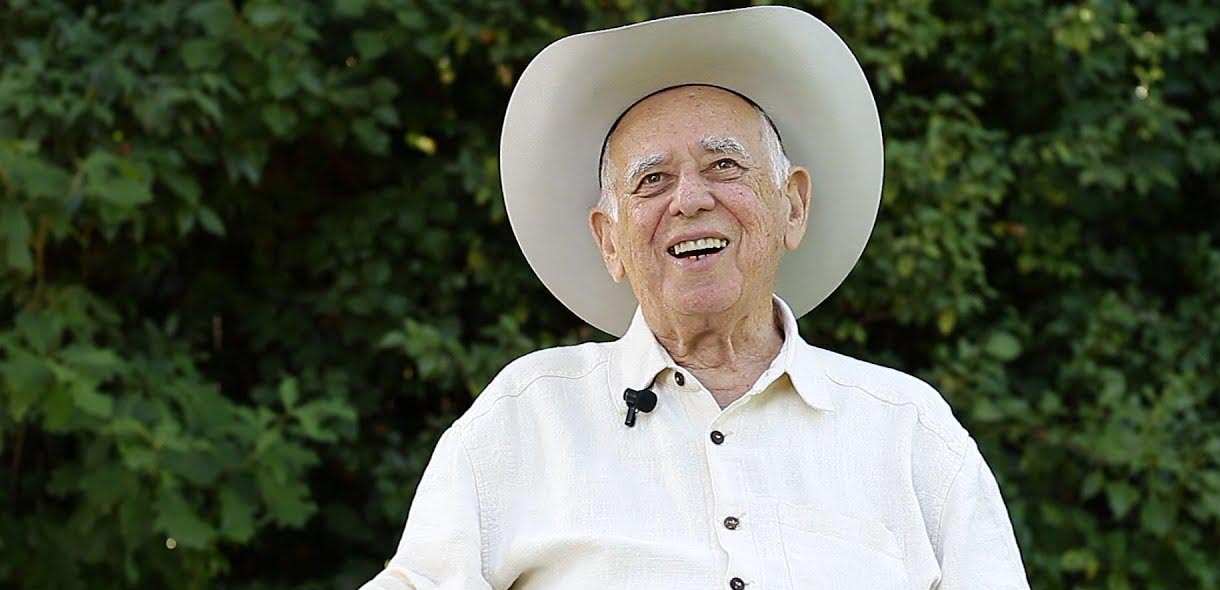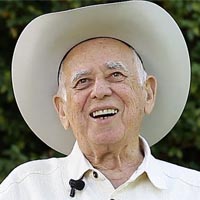
 In Memorial: S David Freeman 1926 - 2020
In Memorial: S David Freeman 1926 - 2020
Winning Our Energy Independence
From EV World's Audio Archives: A conversation with the the author of "Winning Our Energy Independence: An Energy Insider Shows How."
Here's a bold First 100 Days agenda for the next President of the United States. Outlaw the construction of all new coal-fired and nuclear power plants in America.
That's right make it illegal to build any more dirty, polluting, radioactive "factories", as S. David Freeman calls them. And then set in motion a fixed time table to dismantle all existing such power plants, replacing them with comparable renewable energy systems including massive solar and wind installations.
Sound impossible?
Freeman, who has headed the Tennessee Valley Authority and the Sacramento Metropolitan Utility District or SMUD, as well as served as an energy advisor to President Jimmy Carter, doesn't think so. In fact, it's his view that this is the only sane, logical, economic and environmentally-viable course we -- and the rest of the nations on the planet -- can take.
He spells out how we accomplish this goal in his soon-to-be-released (Oct. 2007) book, Winning Our Energy Independence: An Energy Insider Shows How" .
Some of his prescriptions include the following:
In addition, he would require all utilities to submit to their Public Utility Commissions a 30-year plan to retire their coal and nuclear power plants. Natural gas plants -- which are the lowest emitters of carbon dioxide and most efficient fossil fuel plants -- can continue to operate largely as back-up power for wind and solar.
Importantly from the perspective of EV World, the nation would encourage the development and deployment of plug-in hybrids and all-electric cars who acquisition is encouraged by offering owners low-cost use off-peak power rates, along with tax credits.
"These cars should become more numerous in the years ahead, and the beauty is that the extra electricity can come from renewables and natural gas," Freeman writes.
As you'll hear, Freeman is both plain-spoken and passionate, accusing the fossil fuel and nuclear power industries of "brainwashing" the public with "lies" wrapped in clever marketing slogans. You can listen to our 32-minute conversation by using either of the two (Quicktime and Windows) MP3 players above or by downloading the complete 7.4MB audio file to your computer hard drive for transfer to your favorite MP3 player.
Mr. Freeman's book can be pre-ordered on Amazon.com.
He says that our truly abundant energy sources are the renewables, which include wind, solar, biomass, geothermal, water (wave,tidal,hydropower) and that there is plenty of each to replace all of our current fossil fuel and nuclear power plants. We also need to make the transition, sooner, rather than later, he stressed.
Freeman says that if you believe only half of what Al Gore says in "An Inconvenient Truth" or what national security experts say about our addiction to oil funding the terror campaigns of Islamic radicals, including the controversial nuclear enrichment program in Iran that could result in that country acquiring nuclear bombs -- joining Pakistan, India and Israel -- then we need to stop using fossil fuels and making more "radioactive factories", i.e. nuclear power plants now.
The phrase "clean coal" is one such lie, he says, pointing out that while the chairman of the TVA, he bought 30 million tons of coal a year and it is "dirtier than dirt."
Another is "safe nuclear power", which ignores the fact that not only haven't we figured out what to do with the highly-radioactive waste, but that we are encouraging nuclear proliferation and all its attendant dangers, as well as offering all-to-tempting targets for terrorists.
He wants to see people get active and lobby Congress for change, instead of sitting back and letting big energy use its money to get its way at our expense.
The electric power industry in the 1960's called Freeman a "socialist" and "anti-American" for espousing energy efficiency, which has now become an acceptable practice of business. Industry is now even starting to "pay lip service" to renewables.
The argument that solar is ten times the cost of coal ignores both the life cycle and societal costs of the latter, including the health and global warming costs.
[ED. NOTE: As David Blume puts it in "Alcohol Can Be A Gas", we are allowing companies to privatize the profits while socializing the costs.]
While the initial cost of solar is more -- but steadily coming down over the long term -- it is an inflation-proof investment, unlike coal, oil, natural gas and nuclear power.
He is a strong advocate for the electrification of our transportation system, especially the introduction of plug-in hybrids and all-electric vehicles "in the future." He sees the former as the bridge to all-electric vehicles, which will someday include hydrogen fuel cell vehicles. The plug-ins offer the equivalent of $1 a gallon gasoline. And when that electric power comes from renewables, it is equivalent to powering the car with the sun. Supplementing the electric power with ethanol in the internal combustion engine also, in effect, puts sunshine in the tank, as well since the common denominator in both processes is sunlight where photons generate an electric current, heat the earth and create wind currents, and power plant photosynthesis.
The result is a handful of cars that are here now using today's technology and don't use a drop of petroleum, but we need to move much more quickly at "the nation's pace, not Detroit's pace." If consumers start asking for plug-in hybrids and the government provides sufficient tax credits, the transition can happen very rapidly.
Freeman asks how can we tell Iran that they can't have nuclear power, while the U.S. president hypocritically says they're safe and we should be building more of them? We can only bring nuclear proliferation under control by setting an example to the world, which we are not doing. On top of the potential threat of a terrorist acquiring enough plutonium to build a bomb; and that plutonium comes from the reprocessing of spent nuclear fuel rods, which the industry is advocating we begin to do again after President Carter banned, this despite the fact that it is completely uneconomic.
Freeman calls nuclear power advocates "religious zealots" who have a religious belief in the technology. The industry, he argues, had twenty years to prove itself and failed miserably, not because of Ralph Nader or Jane Fonda, it was the financial vice presidents of the various utilities when the plants became too expensive.
He envisions a virtually carbon-free power system -- including transportation -- within 30 years by steadily replacing obsolete fossil fuel and nuclear plants with renewable systems. This will help reduce some of the worst aspects of global warming, but just as importantly will definitely improve the nations security.
Bill Clinton thoroughly understood the issues, but after his ill-fated BTU tax failed to pass, he "had other fish to fry" as Freeman put it. However, the former President still believes that the energy issue is a winning issue and is likely to become a central part of his wife's presidential campaign.
That being said, it is clear to Freeman that the American people are much more ready for this kind of change than either the Congress or any of the current score of Presidential hopefuls. He is of the opinion that what we need is the energy and environmental equivalent of a Martin Luther King with the moral authority to move America, but he doesn't see that in any of the current crop of candidates.
Not only doesn't he see the values he's looking for in these politicians, but many of them repeat the propaganda of the coal, oil and nuclear power industry. What is needed is education of the American body politic and public, which is why he wrote his book in plain English so even high school students can understand it.
His hope is that "Winning Our Energy Independence" will inform public opinion, "which is the foundation for action in this country."
IN BRIEF: Synopsis of David Freeman Interview
First Published: 2007-09-12
Pages Viewed: 23801
